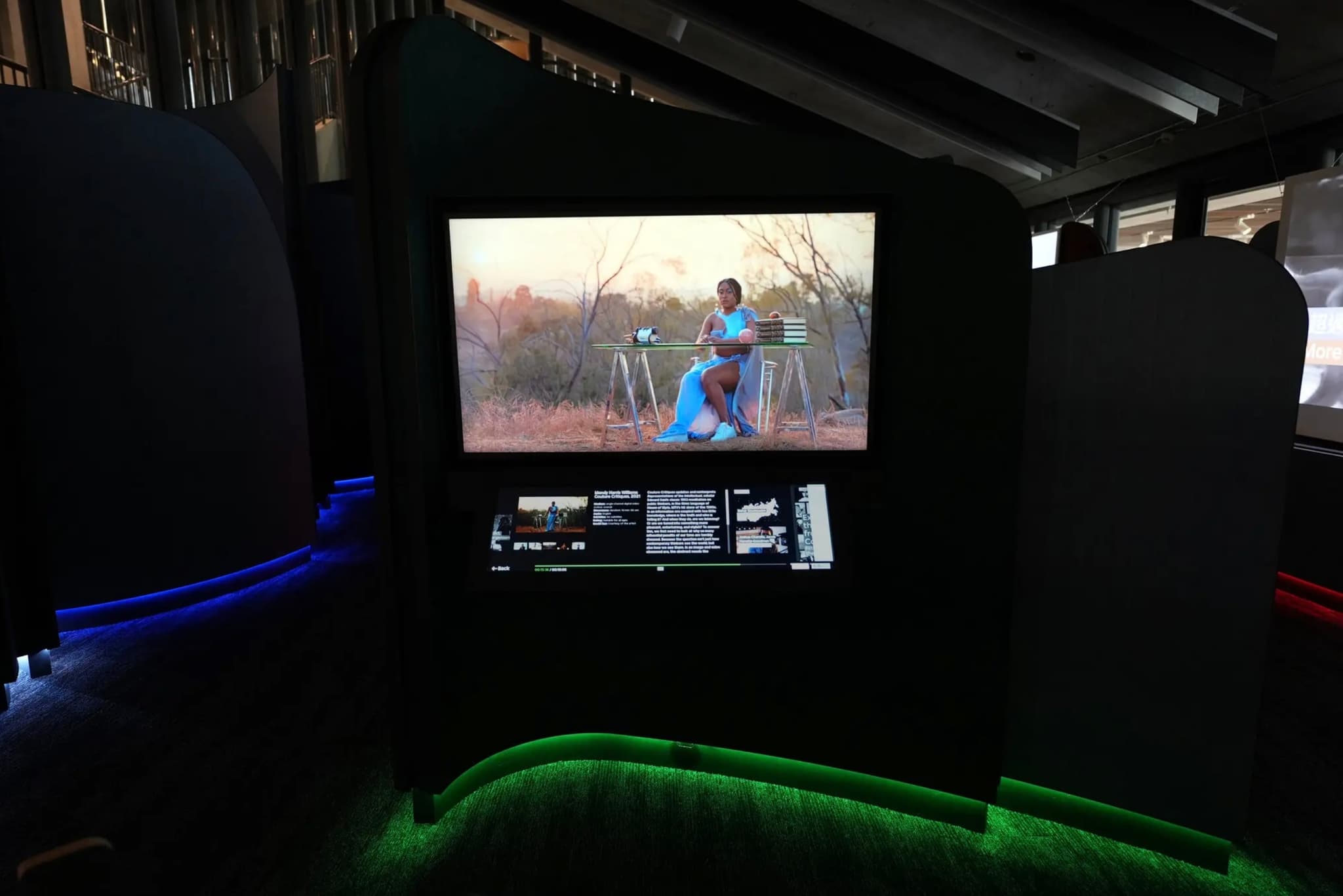A Different Kind of Museum - DIS, Subject to Shadowban at M+, Hong Kong
March 2023

Many international visitors to this week’s Art Basel Hong Kong will finally get a chance to see the museum M+, located just across Victoria Harbor from the fair’s home in the Hong Kong Convention and Exhibition Center. The museum was completed in 2021, when local quarantine restrictions were still in force.
The museum has partnered with Art Basel to present a moving-image work on its facade by Pipilotti Rist, “Hand Me Your Trust.” Inside, a large show of Yayoi Kusama’s work, on view until May 14, may be a big draw, given Ms. Kusama’s superstar status among art lovers. But a smaller show, “Subject to Shadowban,” reveals a key strand of the museum’s DNA. “We’re a museum built in the 21st century, and we’re focused on digital culture,” Ms. Blair said.
The exhibition looks at who controls what we see on the internet and how that shapes us. Ms. Blair said that visitors to the show would be “surfing the museum” just as they surf the internet.
“This touches all aspects of our lives,” Ms. Blair said. The word “shadowban” refers to the practice of blocking users in an internet forum without their knowledge. “Subject to Shadowban,” on view until June 30, takes place in the Mediatheque gallery, which normally has videos from the M+ collection. Ms. Blair asked the New York collective DIS to curate the show, and it selected 12 videos by different artists, some of which it commissioned. DIS, founded in 2010 as an online magazine, morphed into a digital platform for art and editorial projects, with some of its content only for subscribers.
Lauren Boyle, one of the four current members of the DIS collective, said that the show’s theme came from being curious. “We were just asking these questions,” she said. “Is Meta a company or a general state of being online? How is our online life affecting the rest of our lives?” (Meta is the parent company of Facebook, Instagram and WhatsApp.) Ms. Boyle added that once the DIS team started on the project, “we surprised ourselves by seeing how many overlapping topics there are.”
The approach of the works in the show varies widely. The stop-motion animation “Once Upon a Who?” (2021), by the artist Simon Fujiwara, traces the origin of a character he invented during the pandemic, Who the Baer; it roams the internet in search of a self, consuming everything in its path.
The video essay “DOMESTIC/STANDARD” (2020) by Nicholas Korody features clips of music videos, advertisements, pornography and YouTube how-to videos to look at how society values and controls domestic labor like child care and cleaning.
“Couture Critiques” (2021) by Mandy Harris Williams uses the visual language of the MTV series “House of Style” to unpack the ideas behind a 1993 lecture series given by the author and critic Edward Said, “Representations of the Intellectual.” The works in “Subject to Shadowban” are united by a “cynical tone,” Ms. Blair said. There seems to be wide agreement that the internet could be a lot better than it is, but the artists make an effort to engage the audience rather than lecture.
As Ms. Blair put it, “The works mostly have an educational component, but they are funny and weird.”
Jacob Hurwitz-Goodman’s 20-minute video essay “September 5th, 2006” (2022) started as an Op-Doc for The New York Times, and is presented at M+ in an expanded version.
Mr. Hurwitz-Goodman, a filmmaker based in Los Angeles, still remembers the date in the work’s title. “The film is about the day that Facebook launched its news feed,” he said. “I was in college. And the day has haunted me since.”
Previously, users decided how to navigate Facebook, which was a collection of individual profiles.
“My argument is that that newsfeed choice changed the internet forever,” Mr. Hurwitz-Goodman said. “That was the first time most people had been exposed to an algorithm-curated experience.”
Though created by humans, it is the machine-run aspect of the algorithm that bothers Mr. Hurwitz-Goodman. “The internet used to have different physical laws, where you navigated it,” he said. “Now, the internet comes at us, and we’ve been stripped of a certain autonomy.” He added, “The theme of my piece is about how a few powerful people can control how we see ourselves.”
The married, Brooklyn-based couple Franco and Eva Mattes have been tackling internet-related topics for years, often with many layers of artifice to make their point.
In their 47-minute video “The Bots,” they examine content moderation on Facebook — the title is ironic, since their subject is the people who decide what can and cannot be said on the site.
“We work a lot on the radicalization of politics and how that’s encouraged by social media,” Mr. Mattes said. “It gets pushed to the extremes rather than the center.”
They have firsthand experience being banned: YouTube removed one of their works in 2010.
For “The Bots,” working with the writer Adrian Chen they interviewed the people who moderate Facebook posts. Then they hired actors to re-enact the interviews, filming themselves on their phones.
In another twist, the actors pretend to be giving a makeup tutorial, a nod to a way that some TikTok users try to slyly impart educational information in a format that’s palatable to users. “One of the things that is fascinating is that moderation is often carried out by outsourced companies,” Mr. Mattes said. “It’s even more scary than a government doing it. Governments are paradoxically more transparent and accountable.”
The makeup tutorial element adds another layer of meaning, Ms. Mattes said.
“Putting on makeup is part of introspection — looking at our faces in the mirror,” she said. “Content moderation beautifies the surface of the internet.”
By Ted Loos